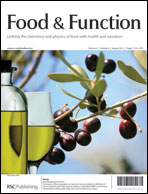Olive fruits from the Koroneiki cultivar (Olea europaea L.) grown in Messenia, Greece, were hand-picked from the same trees in progressive maturity stages, covering three months, and processed identically with a commercial olive mill and a three-phase decanter. Data on quality parameters, and antioxidant activity of the obtained oils were collected by employing the conventional analytical methods set by European Union Commission Regulation no. 61/2011. Additionally, the potential of oils' polar extract to inhibit total serum lipid oxidation and inflammatory markers in stimulated human mononuclear cells was assayed. The results showed that ripening caused an increase in monounsaturated and decrease in polyunsaturated fatty acids, as well as an increase in phenolic compounds – mainly hydroxytyrosol – and in squalene. The extracts' ferric reducing power was in line with the increase of phenolic compounds. In later stages of maturation, lipoprotein oxidation was less potent and the decrease of inflammatory markers in stimulated human mononuclear cells was more powerful. Sensory evaluation detected differences in oils' “bitter” attributes, while the analysis of oils' volatiles revealed quantitative differences.

You have access to this article
 Please wait while we load your content...
Something went wrong. Try again?
Please wait while we load your content...
Something went wrong. Try again?


 Please wait while we load your content...
Please wait while we load your content...